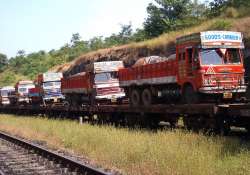To combat Delhi’s pollution, Railways starts RO-RO service to carry trucks
Shifting the movement of loaded trucks from the roads to the rails, Railways Minister Suresh Prabhu on Thursday flagged off the National Capital Region’s (NCR’s) first pilot project on Roll-on Roll-Off (RORO) service – a multi-modal transportation mo

Shifting the movement of loaded trucks from the roads to the rails, Railways Minister Suresh Prabhu on Thursday flagged off the National Capital Region’s (NCR’s) first pilot project on Roll-on Roll-Off (RORO) service – a multi-modal transportation model aimed at reducing Delhi’s air pollution.
About 30 loaded trucks were transported on the flat wagons from Garhi Harsuru station in Gurugram for Muradnagar in Uttar Pradesh. The service will subsequently be offered on eight other routes.
"The RO-RO is a boon for Delhi as it would have a direct impact on its air ambient quality and the capital would breathe clean air," Railway Minister Suresh Prabhu said after launching the service here.
According to plans, heavy commercial vehicles passing through Delhi will be loaded on flat railway wagons at railway terminals outside the capital and will get unloaded at the other end of the city.
RO-RO service aims to reduce carbon emission and congestion on the roads of the NCR as about 66,000 diesel-guzzling trucks pass through Delhi and its adjoining areas in a day.
According to railways, there are about 20,000 trucks which are not meant for the NCR, but enter the region to travel further. There are eight entry/exit routes in the NCR
which will be utilised for RO-RO service to take trucks off the road.
It is a win-win situation for truckers as well as for railways as goods will be transported in safe and faster way, saving cost on diesel and man-days besides reducing the
pollution level, he said.
Besides the Ro-RO service, a series of initiatives were unveiled to perk up railways revenue through increase in the freight share and passengers segment. The business plan envisages commissioning 100 new freight terminals, introduction of double stack dwarf containers and firming up long term agreements with freight customers.
"The business plan-2017-18 was formulated to cater to the requirement of stakeholders and we have changed the policy after discussion with our customers,” Prabhu said
Taking note of railways falling share, he said, "Normally a leaf from the tree does not fall like that. The process starts long before the fall. Similarly the decline in traffic has also started not now but much before. Once railway was only option for freight so it had the monopoly. But with the change of time railways share started declining. There are various reasons like economic slowdown on global stage which affected Indian market also.”
Freight earning is two-third of railways total revenue.
"However, despite challenging situation, we have managed to improve in the loadings. We have created capacity of 1.2 billion tonnes for cargo," he noted.
The new plan envisages long-term agreement with various freight customers like manufacturers of cement, steel and fertilizer and food grains to attract more loadings.
"In last two years we have changed freight policy constantly. Our endeavour is to taking the stakeholders into consideration. We have tried to expand the freight basket by
targeting more commodities," the Minister said.
Railways main freight share was depending mostly on eight commodities including coal, iron ore, cement, fertilizer and foodgrains. Now railways has identified many more items like plastics, tiles, sandstones, bamboos.
Prabhu also launched the double stack dwarf containers for the movement of goods from Punjab to Gujarat on the electrified route.
With a height of 12 ft 8 inches, dwarf containers are specially designed keeping the overhead electric wire in mind to carry maximum goods. Double stack containers are generally 17 ft high.